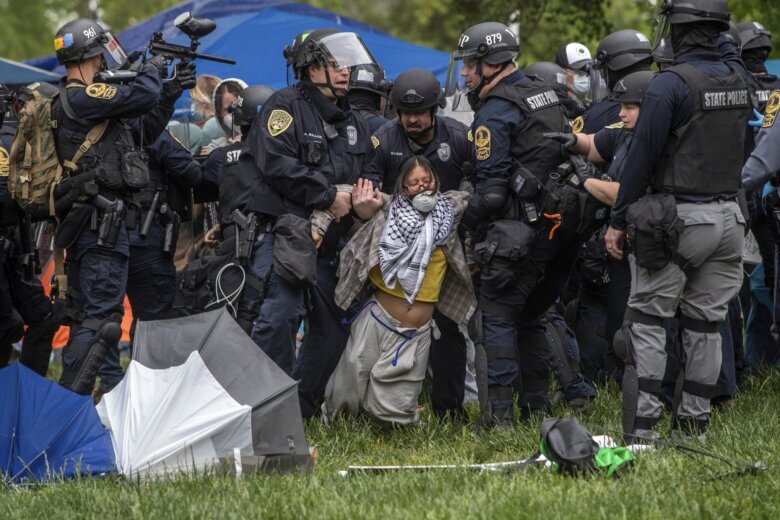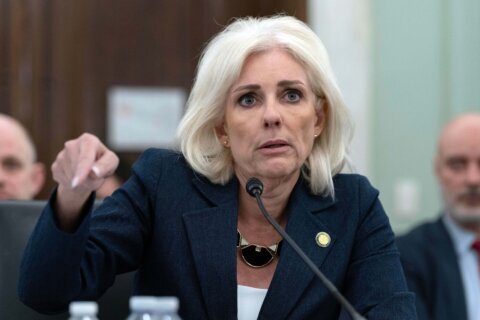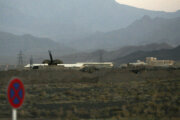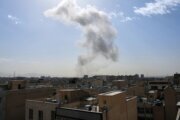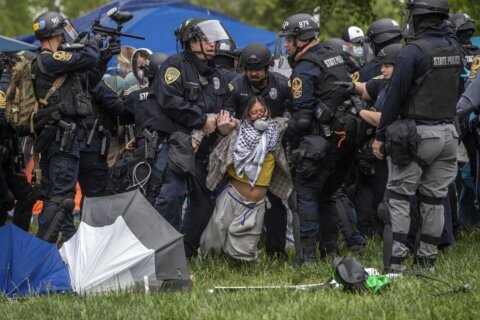
The University of Virginia’s president and police chief have explained why they decided to break up an encampment on campus Saturday, which led police to arrest 27 people protesting against the Israel-Hamas war in Gaza.
While protesters have maintained the law enforcement response was heavy-handed, U.Va. President James Ryan, U.Va. Police Chief Tim Longo and other university officials held a virtual town hall on Tuesday to detail the steps that led to state police using pepper spray while making the arrests for trespassing.
The protesters, who who were in support of Palestinians, put up 22 tents on a lawn outside the school chapel on Friday. Ryan and Longo said police and university officials told the protesters that they would be allowed to stay but their tents would have to come down.
By Saturday morning, Longo’s impression was that the situation was escalating, so he, Ryan and other university leaders, in coordination with state police, made an attempt to preempt a violent confrontation.
“We made the decision to end the protests and clear the area,” Ryan said. “We felt like this is escalating and had the potential to get out of hand.”
Longo said police made amplified announcements to the protesters that they needed to remove their tents or they would be charged with trespassing.
“My warning was clear,” said Longo. “The tents had to come down. They were welcome to stay, but the tents had to come down.”
As Longo and other officials approached the crowd, he claimed they were being surrounded by protesters: “So, I stepped back.”
Longo and Ryan said protest leaders chose not to directly communicate with university officials, so messages were relayed through intermediaries.
“Based on their words, they had a duty to fight for their cause, they had a duty to win and they had nothing to lose,” Longo said. “Their actions and words caused me to conclude that voluntary compliance with my request wasn’t an option they’d be willing to consider.”
Longo and Ryan said protesters physically resisted, and in some cases swung their arms at university officers, who were wearing their regular uniforms.
“It was clear to me, by words and actions, this was escalating, and I was concerned,” Longo said.
“My fear was that if active resistance would continue to escalate, it would be met with reasonable force, to overcome that resistance, and the potential for escalating force was possible and likely,” he said.
After the decision was made for what Longo described as a small group of state police to take action, the arrests happened quickly.
“Once the field force engaged, using their shields to disperse the crowd, the encampment was cleared in about 15 minutes,” said Longo.
One police officer was injured by a frozen water bottle. Longo said there were no serious injuries reported by protesters and those who had been affected by pepper spray were offered water to flush their eyes.
In his six years as university president, Ryan said he and his colleagues have worked hard to build trust with students, faculty, staff and the Charlottesville community.
“I’m fully and painfully aware that we lost some of that trust on Saturday, and that it’s very difficult to regain trust,” said Ryan. “At the same time, I have an obligation as president to make decisions that I think are in the best interests of the entire community, not one segment of it.”
According to Ryan, “Those are no-win decisions, but they have to be made.”
Get breaking news and daily headlines delivered to your email inbox by signing up here.
© 2024 WTOP. All Rights Reserved. This website is not intended for users located within the European Economic Area.

